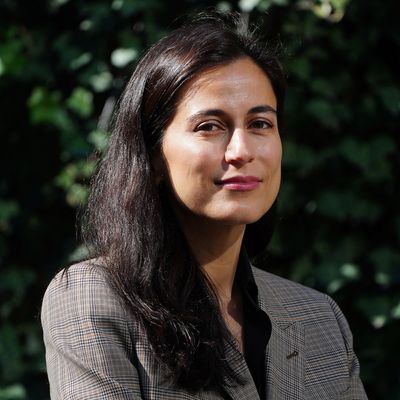
Candidates vying to succeed Cyrus Vance, Jr. as Manhattan district attorney filed their final campaign-finance disclosure reports last week, and one candidate “outraised” the field by a jaw-dropping sum. Between May 17 and June 7, Tali Farhadian Weinstein’s campaign received $8.3 million, far more than the other eight candidates combined. Alvin Bragg, who won The New York Times’s endorsement on May 27, raised $204,942. But the vast majority of money Farhadian Weinstein raised — roughly $8.2 million — came from one donor: Tali Farhadian Weinstein.
“It’s a gross amount of money, an unheard of and unspeakable amount, and its hedge-fund money, a blatant attempt to buy the office,” said Zephyr Teachout, a former candidate for governor and longtime advocate for government accountability. “It’s especially problematic when the job being sought is district attorney, where enormous power rests in the hands of one person. Law should not be for sale.”
Farhadian Weinstein, whose husband, Boaz Weinstein, manages a successful hedge fund, spent much of the past year rejecting criticism about her connections to Wall Street — and the large sums of money those connections have funneled into her campaign — as a distraction. “I’m not the first person to have a spouse with interests and concerns of his own,” she told Intelligencer in May. But Farhadian Weinstein’s string of recent contributions to herself dwarf the millions of dollars she’d raised from Wall Street mega-donors. While contributions to state candidates max out at $37,829 (more than the $2,000 allowed to city candidates or $2,800 to anyone running for federal office), candidates are allowed to donate as much as they want to themselves. Bloomberg spent hundreds of millions on his own mayoral campaigns, for example.
In 2012, Forbes estimated Boaz Weinstein’s net worth at $450 million, good enough to crack the country’s top 400 wealthiest. That same year, the couple bought a Fifth Avenue penthouse for $25.5 million. Weinstein’s Saba Capital Management has made a mint during the COVID-19 pandemic, which the couple and their three daughters reportedly rode out in their $13 million home in the Hamptons.
Bragg and Farhadian Weinstein are locked in a dead heat as the leading candidates, according to a new poll from Data for Progress that has them each earning 26 percent of Democratic primary voters in Manhattan and 21 percent of voters still undecided. Voters have been inundated by ads and information about the chaotic mayoral race in recent months, and standing out in a crowded field of eight candidates for Manhattan DA is costly. Farhadian Weinstein spent $6.8 million over the past two weeks on campaign mailers, digital advertising, radio spots, and television ads. The City reported that, during that period, Farhadian Weinstein spent more on Facebook ads than mayoral candidates Andrew Yang and Kathryn Garcia. Her campaign has spent $11.18 per voter, seven times as much as any other DA candidate, according to Gothamist.
When asked why Farhadian Weinstein had waited until a month before the primary to inject so much of her own money, a spokesperson for her campaign, Jennifer Blatus, said that she is not the only candidate “who has chosen to self-fund.” While other candidates have contributed to their own campaigns — former assistant district attorney Lucy Lang contributed $500,000 to her own campaign — no candidate has done it quite to the same extent.
Farhadian Weinstein’s 11th-hour cash infusion elicited disdain from other campaigns. State Assemblymember Dan Quart said Farhadian Weinstein was “trying to buy this seat, plain and simple.” A spokesperson for Bragg, Richard Fife, said the $8.2 million injection was being used to pay for “insidious push polls and mudslinging mail pieces” that were “an attack on democracy and justice and should be disqualifying to be district attorney.”
“Even before Tali decided to blatantly try and buy this election, her campaign was lavishly funded by hedge funds, Wall Street, and Republican billionaires,” Tahanie Aboushi said in a statement to Intelligencer. “We can’t trust a billionaire to prosecute billionaires, and we can’t trust a creature of Wall Street to hold Wall Street accountable.”
The candidates were not alone in scorning Farhadian Weinstin. “This is emblematic of why we cannot afford to have a Wall Street funded billionaire in the role of Manhattan DA,” tweeted Cynthia Nixon.
Farhadian Weinstein, who has been endorsed by Hillary Clinton and both the Daily News and the Post, has previously tried to allay concerns about her connections to Wall Street by asking a former chief judge of the New York Court of Appeals, Judge Jonathan Lippman, to assess potential conflicts of interest and offer advice on how to deal with them as they arise. At the time, Judge Lippman told the Times he did not find Farhadian Weinstein’s fundraising concerning. When the Daily News endorsed her last month, the paper’s editorial board noted, “while she could have easily self-funded her campaign, Bloomberg-style, so far she is raising money in similar increments as other candidates.”
Farhadian Weinstein came under fire on Monday for more than just her self-financing. The City reported she did not regularly vote in New York City elections until 2016 and registered as a Democrat in 2017, shortly after she interviewed with Trump administration officials to be a federal judge. The 45-year-old Yale Law School graduate, who clerked for Supreme Court Justice Sandra Day O’Connor and Attorney General Merrick Garland when he was on the U.S. Court of Appeals, was working as an assistant U.S. attorney at the time she interviewed. She later resigned from the Justice Department before taking a job as general counsel to Brooklyn District Attorney Eric Gonzalez.






























